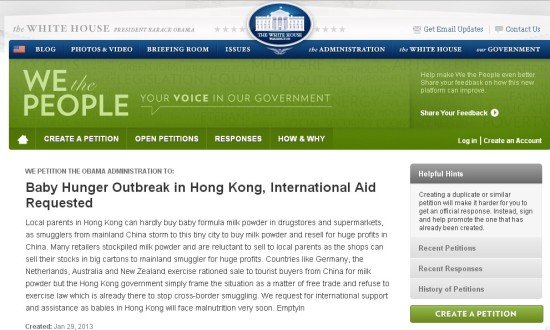Hong Kong's New Milk Powder Restriction Sparks Complications Between Mainland And Hong Kong

This infant formula crackdown comes in wake of a dwindling supply of the two best-selling milk powder brands in Hong Kong. Most people attribute the supply shortage to throngs of mainland milk powder traders who are flooding to Hong Kong and diverting large quantities of infant milk powder from the local supply.
The government therefore made infant formula a restricted export item together with pesticides, some pharmaceutical products and rough diamonds. Under this regulation, anyone without a license or exemption who attempts to take more than 1.8 kg (about two cans) of milk powder out of Hong Kong is liable to a fine of up to HK $500,000 or two years’ imprisonment.
This measure, which took effect on March 1, gained wide support and popularity among Hong Kong parents hurt by the milk shortage and locals who feel disturbed by the long lines of Chinese milk powder traders at supermarkets, airports and subways.
However, mailanders criticized the move for being contrary to free-trade policy. Media outlets in mainland also reacted overwhelmingly negative to the export limits. Some said the rule violates World Trade Organisation regulations. Others went as far as comparing the restriction to a "UN embargo" against the mainland.
Global Times, a Chinese publication in mainland for example, said this move constitutes humiliation to both Mainland China and mainland baby-formula shopper that create jobs in Hong Kong.
The main criticism boils down to a violation of free market principles. Even some experts in Hong Kong oppose the new measure, believing the limit is protectionist.
“Our babies were never deprived of food, but they were deprived of their parents' idea of the best food,” Selina Chow, the chairman of the Liberty Party, told South China Morning Post.
“I am saddened by this move by the government. It hits at the very core of Hong Kong's status as a free port, an open society and a shoppers' paradise for all. To justify this move by overstating and overreacting to the temporary shortage of certain brands of a commodity is to unnecessarily fan the fire for protectionism,” added Chow.
People are also reflecting on the mainland’s problems of food safety deficiency and a lack of public trust.
The exposure of a series of dairy product scandals in the few years, including a high-profile melamine poisoning scandal, has crippled public trust to the domestic dairy products.
An Chinese op-ed published on Xinhua raised the point that 99 percent of domestic milk powder is safe. A famous Chinese newsman Yongyuan Cui replied: “but the question is how can I know where the one percent is?”
The new drama between mainland China and Hong Kong echoes an old one, when mainlanders giving birth in Hong Kong to establish residency incited a wave of outcry.
A generation of mainland women born in the '80s are now entering childbearing age. Coupled with the collapse of public trust of domestic dairy products and high custom duties of imported foreign brands, the population growth has compelled more and more Chinese families from the mainland to resort to buying products from Hong Kong, Australia, New Zealand and Europe. Many of those countries have also imposed some form of restriction on milk trading.
In response to the ban, mainlanders are urging the government to reduce the import tax of foreign milk brands and take determined actions to restore public trust to the dairy industry.
Reach Staff Reporter Zhao Chen here.
More Related Articles:
Milk powder restrictions are not designed to humiliate Chinese mainlanders



